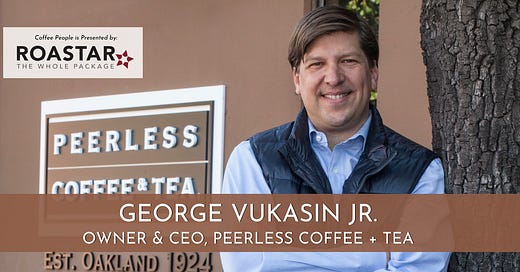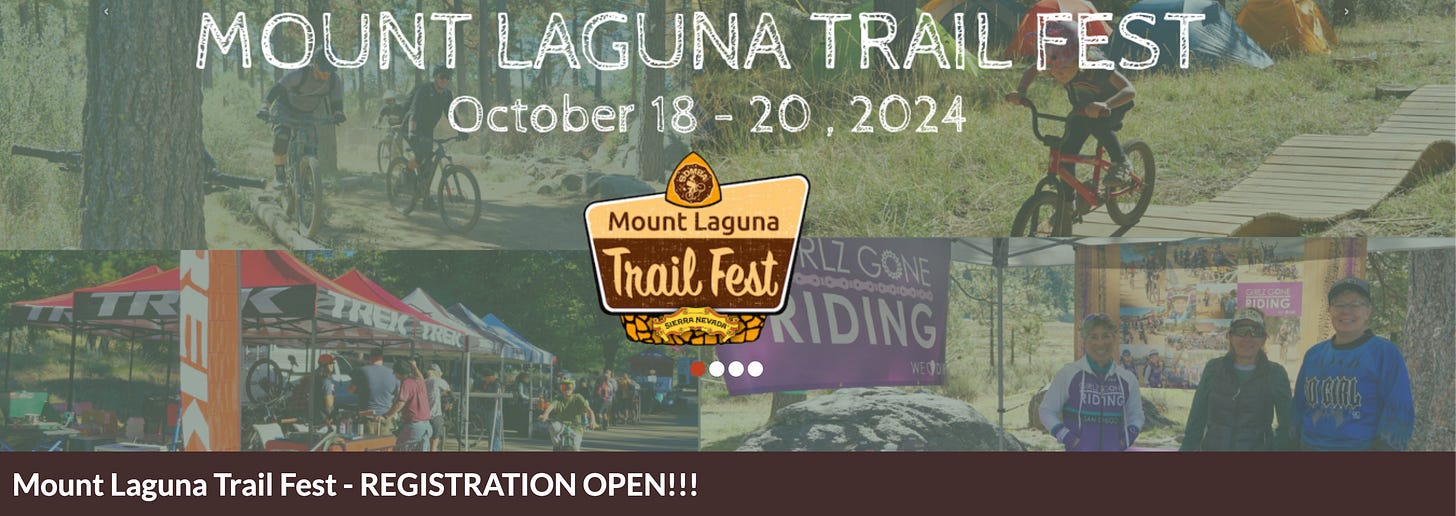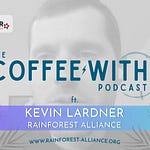Guest: George Vukasin Jr.
Company: Peerless Coffee + Tea
Role: CEO/President • Based: Oakland, CA
Online: www.peerlesscoffee.com • @peerlesscoffee on Instagram
What they drink: Black coffee
“Since 1924—when the Bay Area was home to some of the biggest names in the coffee business (Folgers, Hills Brothers)—three generations of the Vukasin family have kept the company relevant: becoming one of the first to be certified organic in 1980, pioneering dark-roasted specialty coffee, launching a cafe featuring espresso drinks, crafting a bottled organic cold brew, and, now, releasing its first ROC (Regenerative Organic Certified) blend for its 100-year anniversary.”
-From Peerless Coffee + Tea
KEY TAKEAWAYS FROM THE PODCAST
George is the third generation at the helm of this family business. As a child he’d take naps on stacks of burlap coffee sacks, and cup hot chocolate while his father cupped coffees.
It wouldn’t have been unlikely for George to go down a different career path. Falling in the footsteps of a parent can be daunting or in some cases expected, inspiring rebellion. George and his sister Kristina Vukasin-Brouhard (CoOwner of Peerless) had parents who made an effort to hands-off in their career choices, which made the decision to join the family business their own.
Peerless has been around for so long that they have their own coffee museum.
You need to be able to do anything that you ask someone else to do.
• George Vukasin
Staging (pronounced stah-zhing) is a term for a chef or cook working as an unpaid intern in another chef’s kitchen for the purpose of learning new techniques, a new style of cooking, or earning a position in that kitchen. It can be a valuable opportunity for a young chef, but it is a tradition of learning that can and often is exploitative. As such, some U.S. states have put limits on unpaid internships, and the practice has fallen out of favor in many regions worldwide. However, it can be hard to regulate unless there are complaints from the hospitality labor force.
At the beginning of his career, George moved to Mexico to gain a better understanding of coffee at the production level. The experience has helped shape his perspective as the primary buyer of coffee for Peerless Coffee & Tea.
Roast Magazine’s Roaster of the Year award is well-known. Learn more about how candidates are judged (or apply for 2026) by clicking here.
Put your head down, do the work as best as you can, and if you’re doing it well, sometimes acknowledgment will follow, but it isn’t the award that drives the work.
Their customers were high end quality seekers, but that wouldn’t have been the most profitable route to go when George’s grandfather was making a go of it. I mentioned the coffee contracts being offered by the military.
The U.S. government instituted a coffee rationing program for the public during WWII. This was partly due to the impacts of war on the coffee supply chain, which reduced availability, and also because they were prioritizing the consumption of coffee for service members.
Coffee (and cigarettes) were standard issues for the military in an attempt to provide a semblance of home while on a battlefield far away. Learn more about rationing from the National Park Service. Or if you have time, I recommend you read Uncommon Grounds: The History of Coffee and How It Transformed Our World by Mark Pendergrast, which covers the military use of coffee in more depth.If you find yourself in New Orleans, you may just run into the Rebirth Brass Band.
Help keep us caffeinated by buying us a cup of coffee. Thanks for all your support.
ROC® (Regenerative Organic Certified)
Established in 2017, Regenerative Organic Certified is the first certification program to standardize criteria and benchmarks for coffee production that account for soil health, land management, animal welfare, and farmer/worker fairness.
ROC® aims for a carbon-neutral footprint, to guarantee full transparency in the supply chain, and to ensure that farmers grow crops using regenerative practices.
From Peerless Coffee + Tea:
Peerless’s Centennial Anniversary ROC® Blend: Specially created to mark Peerless’s milestone 100th Anniversary, the blend combines Regenerative Organic Certified coffees from Coop Soppexcca Las Hermanas in Jinotega, Nicaragua with Bird Friendly washed beans from Coop Asprasar in Tolima, Colombia.
Coop Soppexcca Las Hermanas is a Fair Trade and organic-certified coffee cooperative known for its emphasis on gender inclusion and the empowerment of female farmers. Made up of 40% women, it helps affiliated female farmers produce, manage, and market their own coffee.
Profits from sales of Las Hermanas coffee are invested in prevention programs for cervical cancer. Tasting Notes: Small-batch roasted to ensure maximum extraction of flavor notes, this incredible medium roast boasts tasting notes of dark chocolate, dried berries and candied nuts.
CHALLENGES FACING PRODUCERS OF ROC®
For context on how producing ROC® coffees, I reached out to Nicole Diefenbach of Roam Bravely. She is a green coffee sourcing expert and Certified SCA Sustainability Professional (and previously excellent guest of Coffee People). In turn, she reached out directly to the source.
R!WC: Would you share a list of challenges or barriers to entry faced by a farmer producing in a regenerative method that might not impact a traditional farmer?
Nicole: While I had my interpretation of the challenges based on my work with producers who practice regenerative agriculture, I went directly to the source when you asked me. The following is a synopsis from Carlos Pola of Pola Coffee in El Salvador and John Gohring of Cosecha Partners in Nicaragua….
Carlos cited a change of mindset as the main driver for transitioning into what he calls "sustainable coffee growing," albeit regenerative agriculture. With an initial focus on taking extreme care of your soil and shade trees, it takes passion to continually educate yourself on best practices alongside ensuring your work will result in new customers who share your vision. He said, "It's difficult to imagine specialty coffee without sustainability, especially with younger generations."
John's response was detailing Cosecha's experience in smallholder growing communities of Nicaragua as they provide the technical assistance to make that transition.
[Barriers to entry include:]
Access to information: Farmers—particularly smallholders—lack access to information on regenerative organic practices. Especially access to professional agronomic extension services. The norm is conventional—from training to input suppliers and financial services. Regenerative agriculture is a holistic management style, and farmers have to learn new concepts and information in order to successfully adopt these practices while ensuring good yields, etc.
Certifications and record keeping: [There are] inherent cost(s) to certifying your standard of production, which is often prohibitive to small operations.
Access to inputs: Again, the norm is conventional [farming], and input dealers are pushing conventional inputs to farmers. Organic inputs are harder to find and sometimes are more expensive. We teach farmers how to make their own inputs— fertilizers, foliars,* etc. with materials they can find on their farm or in their community which is knowledge intensive.
*Foliars refers to a type of plant feeding that involves directly applying liquid fertilizer to the leaves of the plant.
I’ll be serving up coffee to mtb’ers and campers at the San Diego Mountain Biking Association Trailfest in October. Details & Get Tickets!
ROAST! INDUSTRY PARTNERS
A huge, on-going thank you to all of this show’s industry partners.
Our friends at Sivitz Roasting Machine occasionally use their fluid air bed roasters for a load of hazelnuts, which I can say first hand, are excellent. Click the photo below (which I liberated from Sivitz.com) to learn more about convective air roasting machines.
Roastar • Zumbar Coffee & Tea • Steady State Roasting • Coffee Cycle • Camp Coffee Company • Ignite Coffee Company • Ascend Coffee Roasters • Marea Coffee • Cape Horn Green Coffee • Hacea Coffee Source • Crossings Coffee • Sivitz Roasting Machines • Craft 42 Roasters • Me and My Uncle Coffee Roasters • Cozy Canine Coffee

WHAT WE ARE LISTENING TO WITH OUR COFFEE
BRANDS WE USE & HAVE PARTNERED WITH*
News! We recently partnered with Baratza Grinders. If you’re in the market for a new grinder and considering a Baratza (we have an Encore at home), please use this link. You’ll be getting a great grinder AND supporting Roast! West Coast.
*These links enable us to generate some affiliate revenue. As always, we don’t partner with brands we don’t use, or recommend.

















Share this post